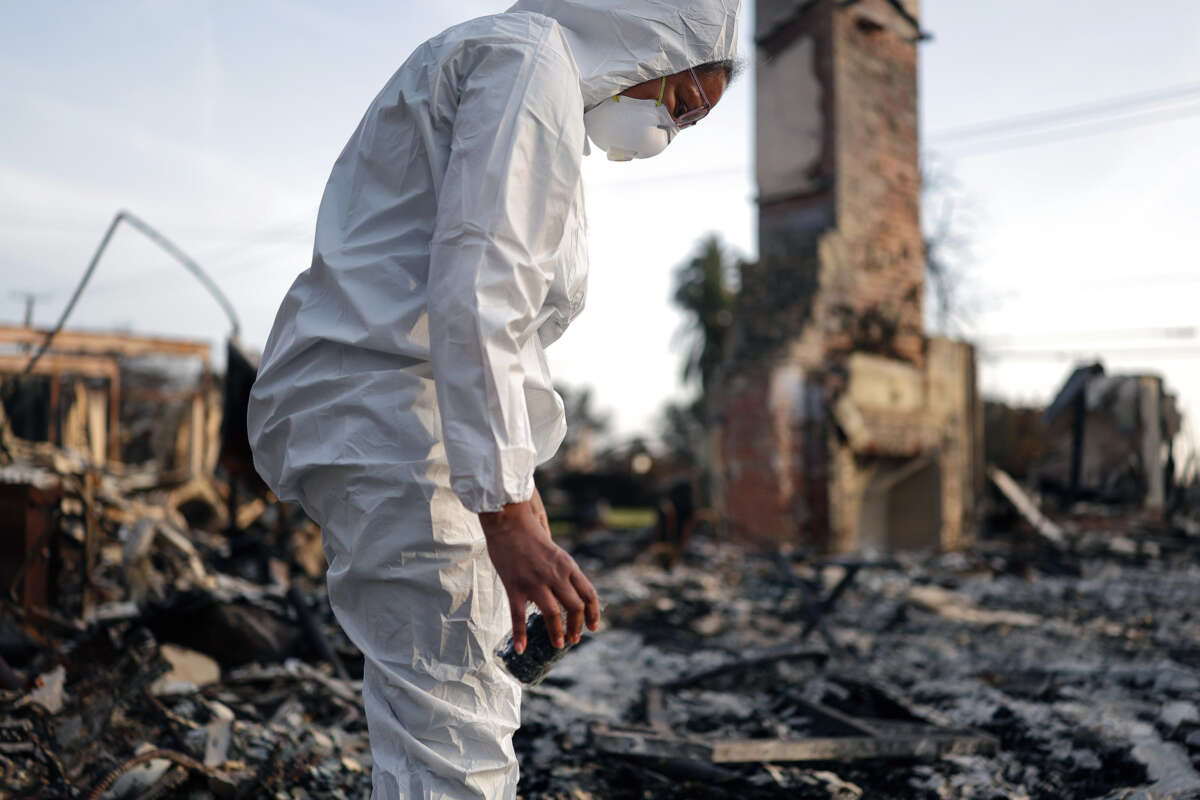Bernardo Osorio, a 60-year-old day laborer from Pasadena, couldn’t believe his eyes as he surveyed the devastation caused by the recent wildfires in Altadena, California. Having lived in southern California for more than 36 years, Osorio was no stranger to the region’s fire season. But the scale of destruction wrought by the Eaton Fire left him in shock.
When he returned to the fire-ravaged area, he found many of the homes he had once worked on reduced to nothing but rubble. Traces of what had once been families’ lives — their kitchens, bedrooms and backyards — were now nothing more than ash. The Eaton Fire, which burned through over 14,000 acres of land, claimed at least 17 lives and impacted more than 9,400 structures. For many residents of Altadena, fleeing the flames meant abandoning their homes with little more than the clothes on their backs, unaware it would be their final glimpse of what they had built there.
In the weeks following the fire, the response from southern California and beyond was swift. Volunteer efforts flooded in, with people offering labor, materials and services to help rebuild. Cities like Pasadena became hubs for organizing food, clothing, and other forms of aid for those affected.
Among those on the front lines of recovery were dozens of day laborers, including Osorio, who have partnered with the National Day Laborer Organizing Network (NDLON) to assist with the cleanup.
Founded in July 2001 in Northridge, California, NDLON began as an alliance of 12 community-based organizations aimed at improving the lives of day laborers across the U.S. Over time, it has grown into a national network, driven by a passionate staff focused on social justice and grassroots connections. NDLON’s significance has only deepened in the context of ongoing immigration and labor debates, especially during Donald Trump’s second presidency, marked by intensified anti-immigrant rhetoric and policies.
Many of NDLON’s immigrant workers have deep ties to Altadena, a historically Black and Latino neighborhood, and now they are playing a key role in its restoration.
“Nosotros somos parte de la comunidad — we are part of this community,” Osorio said, a sentiment that resonates with many immigrant workers leading recovery efforts in the wake of the disaster.
Altadena, a working-class enclave that’s home to generations of Black and Latino families, was decimated by the fire. Osorio, who had relied on his work in the area as a handyman, found himself facing an uncertain future. The fires destroyed not just his clients’ homes but also his livelihood, leaving him wondering what would become of the families he had worked with for years.
Recalling the first week of evacuations, Osorio said [translated from Spanish], “The situation was terrible — just the uncertainty and fear of what could happen next. It’s very dangerous still, many homes were destroyed, and the fumes and ash still remain in the atmosphere.”
The prospect of several families coming together — representing four or five blocks or even an entire section of a community — creates a powerful force.
When recovery efforts began, Osorio jumped at the opportunity to assist the cleanup crews. He quickly became a leader of the service brigade made up entirely of day laborers. Their matching orange uniforms bore a powerful slogan: “Solo el pueblo salva el pueblo” — “Only the people can save the people.”
The words on the uniforms serve as a powerful reminder of the critical role immigrant laborers play — not only in rebuilding homes but in revitalizing the very fabric of southern California’s communities.

Generations of Black and Brown Resilience in Altadena
Altadena, nestled in the Verdugo Mountains of Los Angeles County, has long served as a refuge for Black and Latino families striving to build better lives amid systemic challenges. Just 14 miles north of downtown Los Angeles, the community has historically been a place where homeownership was a hard-earned aspiration and where generational wealth was slowly and steadily being established.
But the Eaton wildfire destroyed many of those aspirations, especially in Altadena’s historically Black community. For decades, residents had worked relentlessly to build stable homes and businesses, often overcoming the lasting effects of redlining and other systemic barriers to create a sense of permanence and prosperity.
Altadena is home to many families who trace their roots back to the Great Migration, when many Black people fled the racial violence and economic disenfranchisement of the South for the supposed promises of California’s sunny skies and economic opportunities. By the mid-20th century, Altadena had become a thriving center for Black culture and entrepreneurship, with families investing their hard-earned money in homes and small businesses.
Latino families, similarly, have made Altadena their home for decades, drawn by the same opportunities for upward mobility and the hope of creating a stable future for their children. But while both communities have been able to establish themselves within this historically Black neighborhood, their paths to financial security have been fraught with obstacles.
Many Altadena residents, particularly BIPOC homeowners, have spent decades paying down mortgages, improving homes and establishing multigenerational family wealth. The fire, which destroyed homes and businesses, has threatened not only the immediate financial stability of these families but also the carefully constructed foundation of wealth that took generations to build.

A Call for Vigilance
As the city’s fire recovery efforts unfold, Altadena’s residents now find themselves fighting against more than just the smoke and ashes — they face the looming threat of a well-worn political and economic strategy known as the “shock doctrine.”
This moment of disaster, as in many other instances of tragedy, has created the perfect opportunity for those looking to capitalize on Altadena’s vulnerability. This is the essence of the shock doctrine, a term coined by Naomi Klein to describe how elites and powerful corporations take advantage of crises — whether natural disasters, wars or economic meltdowns — to push through policies that benefit the wealthy, often at the expense of vulnerable populations.
In Altadena, the shock doctrine could take several forms: upscale developments replacing fire-damaged homes, the erosion of rent control protections and the displacement of low-income renters as property values rise with an influx of wealthier, mostly white residents.
This pattern has unfolded in cities worldwide — from New Orleans after Hurricane Katrina to Maui in 2023 after the Hawaii wildfires. Now, Altadena faces a similar challenge in fending off wealthy developers seeking to “revitalize” the neighborhood, potentially pushing out the very residents who made it their home.
Volunteers at the Pasadena Community Job Center have raised concerns over another troubling trend: lawyers attempting to solicit clients at donation sites. According to reports from NDLON staff, legal professionals attempted to set up a table — without permission — at a donation site in Pasadena, in an apparent effort to attract clientele.
The unsolicited offers are widely seen as an attempt to take advantage of vulnerable homeowners desperate for assistance or financial relief. “It’s a clear case of predatory behavior,” said Palmira Figueroa, who witnessed the interactions firsthand. Figueroa, communications director for NDLON, has been directly involved in organizing cleanup and donation efforts in the community.
Civil rights attorney Areva Martin, has been working closely with victims of the Eaton wildfire. In an interview with Truthout, Martin described the predatory legal tactics her clients have encountered in the previous month. “For many lawyers, this [natural disaster] is seen as a litigation frenzy,” she said. “They view this as a lawsuit bonanza, assuming that there may be billions of dollars in settlements down the road.”
Many residents of Altadena are advocating for long-term solutions to address the root causes of displacement, including affordable housing, better fire preparedness and stronger tenant protections.
While Martin acknowledges that ethical rules prohibit lawyers from directly soliciting clients, she has observed a troubling trend of law firms and individuals flouting these guidelines. “Right now, they’re mostly targeting people through advertising on social media,” Martin said, noting that there have also been instances of in-person solicitation, like those spotted at the Pasadena Community Job Center. “People are posting up, sending emails, texting — they’re violating ethical guidelines,” she added.
Martin has been advising her clients to be vigilant, urging them to be cautious and discerning: “Do not sign anything or accept offers from strangers. Go through trusted friends, advisors, vet people and seek personal referrals. Don’t fall prey to predatory lawyers or developers.”
As victims remain in a vulnerable positions, state and local politicians have stepped in to attempt and implement safeguards. Gov. Gavin Newsom signed an executive order last month aimed at shielding homeowners in fire-ravaged ZIP codes from unsolicited offers for their damaged properties. At the same time, California Attorney General Rob Bonta filed charges against a real estate agent accused of attempting to price-gouge a couple displaced by the flames. Such alleged schemes reveal how vulnerable victims of calamities can be, often overwhelmed by the complexities of recovery and unaware of the dangers posed by unscrupulous actors.

“One Door Closed, But a Gate Opened”
As residents assess the long-term damage from the Eaton Fire, one of their greatest concerns is how the rebuilding process will unfold. While local leaders have pledged their support, the community has already stepped in to fill the gaps where city and state aid has been insufficient.
“One door closed, but a gate opened,” Osorio said, reflecting on how the community has come together in the wake of the disaster.
Furthermore, the Los Angeles City Council is poised to consider a series of tenant protections aimed at preventing further displacement of residents affected by the disaster. A proposal introduced by Councilmembers Eunisses Hernandez, Hugo Soto-Martinez and Adrin Nazarian would enact a one-year freeze on rent increases. The immediate stopgap measure is part of a broader package of protections aimed at shielding those displaced by the fires and alleviating the financial strain on vulnerable renters.
Martin acknowledges that while many displaced residents may feel powerless in this moment, there is strength in numbers. “In Lahaina [Hawaii], a group of residents came together and formed a community land trust to buy back their land,” she says. She encourages homeowners who have been displaced to stay engaged throughout the rebuilding process and to collaborate with neighbors in choosing contractor groups.
“I’ve been talking to families about doing that,” says Martin. “Coming together, either as a collective or in smaller groups, to buy the land and then collectively choose a developer.”
While she admits this may feel like a daunting task for one family, the prospect of several families coming together — representing four or five blocks or even an entire section of a community — creates a powerful force, one that can move forward as a unified front.
As calls for systemic change grow, many residents of Altadena are advocating for long-term solutions to address the root causes of displacement, including affordable housing, better fire preparedness and stronger tenant protections. In the wake of the Eaton wildfire, there is a renewed sense of urgency around uniting Black and Latino communities to rebuild, ensuring that all voices are heard in the process. By coming together, these historically marginalized groups can not only protect their homes but also strengthen their collective power to demand lasting change.
The Eaton wildfire has rattled Altadena to its core, but for many residents, the fight to rebuild, protect their community and ensure a place for all within it is just beginning.
Note: A correction has made to the spelling of Bernardo Osorio’s surname.
Our most important fundraising appeal of the year
December is the most critical time of year for Truthout, because our nonprofit news is funded almost entirely by individual donations from readers like you. So before you navigate away, we ask that you take just a second to support Truthout with a tax-deductible donation.
This year is a little different. We are up against a far-reaching, wide-scale attack on press freedom coming from the Trump administration. 2025 was a year of frightening censorship, news industry corporate consolidation, and worsening financial conditions for progressive nonprofits across the board.
We can only resist Trump’s agenda by cultivating a strong base of support. The right-wing mediasphere is funded comfortably by billionaire owners and venture capitalist philanthropists. At Truthout, we have you.
We’ve set an ambitious target for our year-end campaign — a goal of $240,000 to keep up our fight against authoritarianism in 2026. Please take a meaningful action in this fight: make a one-time or monthly donation to Truthout before December 31. If you have the means, please dig deep.
